CBI files final charge sheet in excise policy case against Delhi CM Arvind Kejriwal
New Delhi, July 29
Concluding its probe in the alleged Delhi excise policy scam, the CBI on Monday filed its final charge sheet in the case against Chief Minister Arvind Kejriwal and others, officials said.
The CBI earlier filed one main charge sheet and four supplementaries in the case in which former Delhi deputy Chief Minister Manish Sisodia, Telangana MLC K Kavitha and others have also been charged.
The agency said the one filed on Monday will be its final charge sheet in the case.
Liquor businessman Magunta Sreenivasalu Reddy (a TDP MP) met Kejriwal on March 16, 2021 in his office at the Delhi Secretariat and requested him to provide support in his liquor business in the national capital by tweaking the Excise Policy 2021-22 which was then in the making, the agency said in its charge sheet against K Kavitha.
Kejriwal assured support to Reddy and asked him to contact the accused K Kavitha as she was working with his team on the Excise Policy of Delhi, the CBI had alleged.
Kejriwal in turn allegedly told Reddy to provide funds to his political party, Aam Aadmi Party, it had alleged.
The CBI also alleged that kickbacks of around Rs 90-100 crore were paid in advance to some politicians of the ruling AAP in Delhi and other public servants by some persons in the liquor business from South India through co-accused Vijay Nair, Abhishek Boinpally and Dinesh Arora to tweak the Excise Policy for 2021-22.
The agency had alleged that these kickbacks are found to have been returned to them subsequently out of the profit margins of wholesalers holding L-1 licenses through different modes, like issuance of excess credit notes, bank transfers, and outstanding amounts left in accounts of the companies controlled, by some conspirators from the South lobby.
The CBI had alleged a cartel was formed between three stakeholders of the said policy — liquor manufacturers, wholesalers and retailers — by violating provisions and against the spirit of the policy.
All the conspirators allegedly played active roles in achieving the illegal objectives of the said criminal conspiracy. It resulted in huge losses to the exchequer and undue pecuniary benefits to the public servants and other accused involved in the conspiracy, the CBI had alleged.









